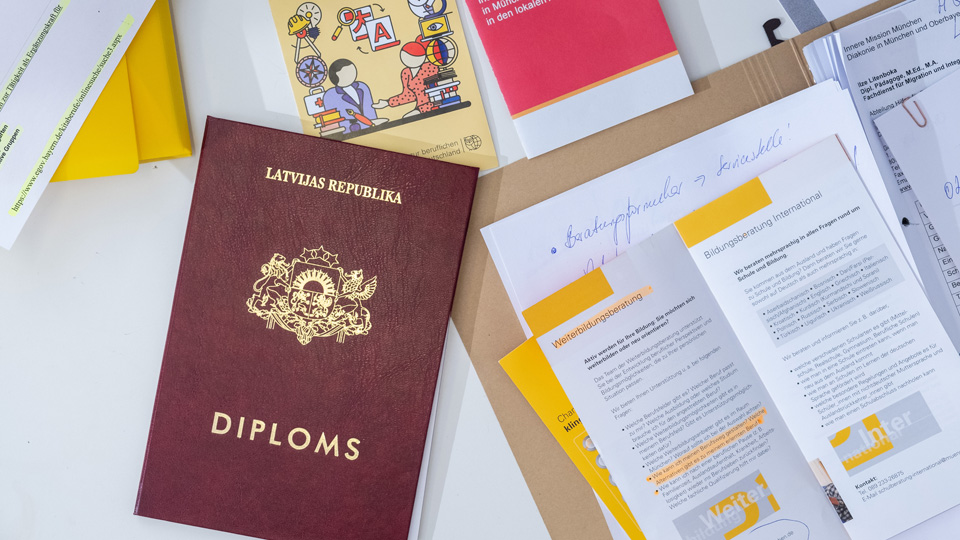Foreign professional qualifications ,
The Federal Office will be happy to advise you if you obtained your professional qualifications abroad and would like to use them on the German labour market.
N.B.

Please note that we cannot assess the equivalence of your qualification over the telephone. This assessment will be carried out by the office responsible.
In the consultation you can choose to receive initial information in either German or English concerning the recognition of foreign professional qualifications in Germany.
We will also work with you to try to help you find the office responsible for the recognition process in your profession. You will also find out how the process works, whom you should approach for a detailed and personal advisory interview, and which documents you need.
You furthermore have the option of sending your questions concerning the recognition of foreign professional qualifications to us, using the contact form that is available in German and English. Please note that we need various details to provide appropriate information. This will help us to respond to your enquiry more quickly.
The recognition procedure
Contact

Do you have any questions? Please contact us!
"Hotline Arbeiten und Leben in Deutschland"
Phone
+49 30-1815-1111
You can ask for your professional qualification acquired abroad to be compared with the German professional qualification. In order to make an application, interested parties must contact the office responsible for their professional group. Information about the offices that are responsible for individual professions can be found on the Internet at www.anerkennung-in-deutschland.de, or by calling +49 30-1815-1111.
First, the applicant must decide with which specific German professional qualification they want their qualification to be compared. The office responsible will be happy to help in this regard.
Once the documents have been submitted, they will be assessed to see if there are any significant differences between the professional qualification that was obtained abroad and the German professional qualification. If this is the case, an assessment will be carried out in order to ascertain whether the differences can be made up for by using other qualifications or through professional experience. If the documents are inadequate for assessing the professional qualification, a qualification analysis may take place, e.g. by testing the applicant's work or carrying out professional interviews. With effect from 1 December 2012, the process should not take longer than three months as a rule if all the documents are complete.
FAQs

Full equivalency will be certified if no significant differences are established between the foreign and German qualification. In the case of regulated professions, the professional accreditation will be issued. If the procedure establishes significant differences between the foreign qualification and the German professional qualification, the applicant will receive an assessment for non-regulated professions in which these differences will be precisely stated. This will allow applicants to apply to employers directly or to select further training that is suitable for the individual. In regulated professions applicants can make adjustments to compensate for the differences. Depending on the profession, they will need to attend a course to qualify fully or sit a professional examination.
Fees are charged for this procedure, and these are set by the office that is responsible in each case. Applicants should therefore enquire as to the likely costs in advance of making an application. If they are registered as looking for work or receive social welfare benefits, the costs can be met by state agencies subject to certain conditions.
Background information

Having foreign professional qualifications recognised or evaluated is an important step towards integration into the workplace. Since 1 April 2012, immigrants have had the option of having the professional qualifications that they obtained abroad compared with the requirements set for this profession in Germany. This is particularly important if they wish to practise a regulated profession in Germany.
"Regulated" means that the profession cannot be practised without a state approval procedure or without recognition of your professional qualification. In Germany, regulated professions include those in the health and education sectors (e.g. doctor, nurse or teacher). In addition, special regulations apply in some professions if you would like to be self-employed (as a baker or hairdresser, for example).
In non-regulated professions, by contrast, you do not need formal recognition of your qualification to be allowed to work (for example as an employee in retail or as an IT worker). In these cases, you can apply for jobs on the labour market without having your qualifications assessed. Having your qualifications assessed can however be useful, as this will better enable employers to evaluate your qualifications.
Your nationality is not decisive in the process, nor do you need to have a residence permit. You can even apply if you do not live in Germany. You must simply have a professional qualification that you have obtained abroad and prove that you intend to work in Germany.
You can find out on the Internet at www.anerkennung-in-deutschland.de or from the "Working and Living in Germany" hotline on +49 30 1815-1111 (charged at standard German tariffs for landlines) whether your profession is regulated in Germany, which laws apply to regulation and which office you must contact to have your qualifications assessed.

